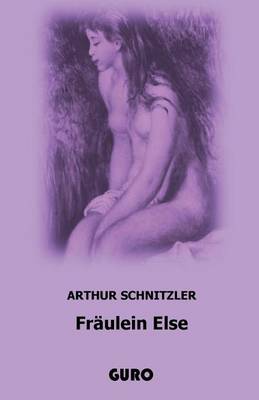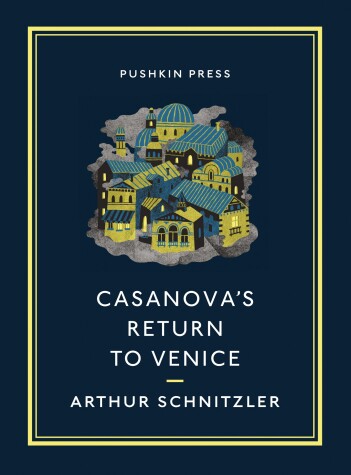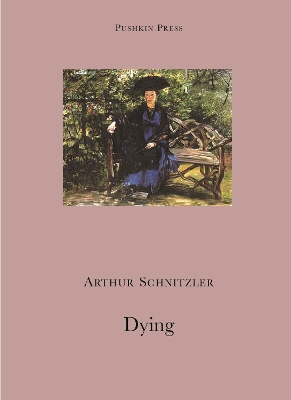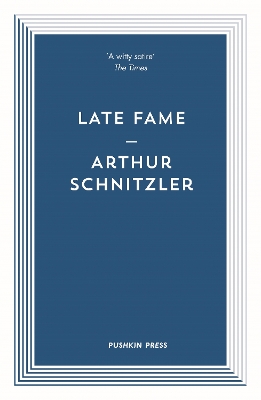Pushkin Collection
4 total works
Fraulein Else is the story of a young woman who, while staying with her aunt at a fashionable spa, receives a telegram from her mother begging her to save her father from debtor's jail by approaching an elderly acquaintance in order to borrow money from him. Forced by the exigencies of her family into the reality of a world entirely at odds with her romantic imagination, we are brought unremittingly to the horrific consequences of Else's realisation that her world is one in which everything has a price and where the veneer of morality is as brittle and transparent as glass.
Translated from the German by F.H. Lyon, Arthur Schnitzler's modernist novella Fraulein Else is published by Pushkin Press.
Arthur Schnitzler (b.1862) was born in Vienna, the son of a prominent Jewish doctor, and studied medicine at the University of Vienna. In later years he devoted his life to writing and was successful as a novelist, dramatist and short story writer. Schnitzler's work shows a remarkable ability to create atmosphere and a profound understanding of human motives.
In Arthur Schnitzler's poignant novella, Casanova's Return to Venice, the famed gambler, adventurer and seducer Casanova has been reduced to melancholy, unhappily civilised by age.
"His yearning for Venice, the city of his birth, grew so intense that, like a wounded bird slowly circling downwards in its death flight, he began to move in ever-narrowing circles." One of Schnitzler's most poignant evocations of the passing of time and the ironies of sentiment and love, Casanova's Return to Venice tells the story of an ageing Casanova's desperate desire to return to the city he truly loves after a life of exile; a desire which is contrasted with his still-libidinous and sensuous - yet weary - pursuit of women, money and prestige.
Arthur Schnitzler's Casanova's Return to Venice is translated from the German by Ilsa Barea, and published by Pushkin Press.
Arthur Schnitzler was born in Vienna in 1862. The son of a prominent doctor, he worked first as a physician and then, following his father's death, as a writer of novels, plays and short stories. His work fearlessly and profoundly explores everything from sexuality to anti-Semitism with an intense understanding of human motives and weaknesses.
When Marie realises, with horror, that Felix is intent on making her fulfill her rash vow to die with him, she is left with a terrible conundrum: how can she escape with her life without compromising the self-imposed decorum of attending to the wishes of her dying lover? Schnitzler's talent as a dramatist shines through in this engrossing and shocking psychological study set in fin de siecle Vienna.
'Schnitzler was a remarkable and versatile talent who adapted for his artistic purposes both the new techniques of psychoanalysis and what was later to be known as the stream of consciousness'--John Bayley, TImes Literary Supplement
Arthur Schnitzler was born in Vienna in 1862, the son of a prominent Jewish doctor, and studied medicine at the University of Vienna. In later years he devoted his time to writing and was successful as a novelist, dramatist and short story writer. Schnitzler's work shows a remarkable ability to create atmosphere and a profound understanding of human motives. Pushkin Press will publish a new translation of Die Traumnovelle, the novel by Schnitzler upon which Stanley Kubrick's based his notorious film Eyes Wide Shut.
Winner of the Newbery Honor: the delightful tale of a wandering good samaritan dog, by the author of Shrek!
Dominic has decided it is time for a change. So he packs up his hats and his piccolo, and sets off into the unknown. But no sooner does he feel the air on his snout and the grass beneath his paws, than disaster strikes: he encounters the dreaded Doomsday Gang.
But Dominic is not one to complain - and nor is he one to lose a fight. As legend of his victory over the villains spreads, more and more creatures turn to him for help: a 158-year-old turtle, a heartbroken wild boar, and a family of grateful geese all encounter Dominic's heroism and generosity.
But his trials are far from over: the Doomsday Gang is alive and kicking, and how can one young dog face a mob of hooligans alone?
"Steig's books are like perfect smooth stones, complete in themselves, with no seams to be found... he always has the skill to bring together what seems to be a lot of spur-of-the-moment choices and make them into stories that land so perfectly and satisfyingly and feel so inevitable in their endings" - Jon Klassen, author of This Is Not My Hat



